Cast iron is a type of cookware that has been used for centuries. It is made from cast iron, a metal alloy.
Cast iron is durable and can withstand high temperatures, making it ideal for cooking. There are many benefits to using cast iron cookware, but what about its health implications?
In this article, we will discuss the safety of cooking with cast iron pots and pans and whether or not it is cast iron is safe to use.
We will also talk about the benefits of using cast iron pans, and we dispel some of the myths about cast iron cookware that are floating around out there.
What is Cast Iron Cookware?
Cast iron, as mentioned above, has been used for centuries.
Cast iron is made by melting down iron ore in a special furnace. The molten iron can then be poured into molds to make different shapes, or it can be recycled to make new cast iron.
Raw cast iron often contains other materials like steel, limestone, and carbon. Sometimes it'll contain unwanted contaminants, also, which need to be removed before it can be used.
The earliest cast-iron artifacts date back to about 2,500 years ago and were found by in China by archaeologists.
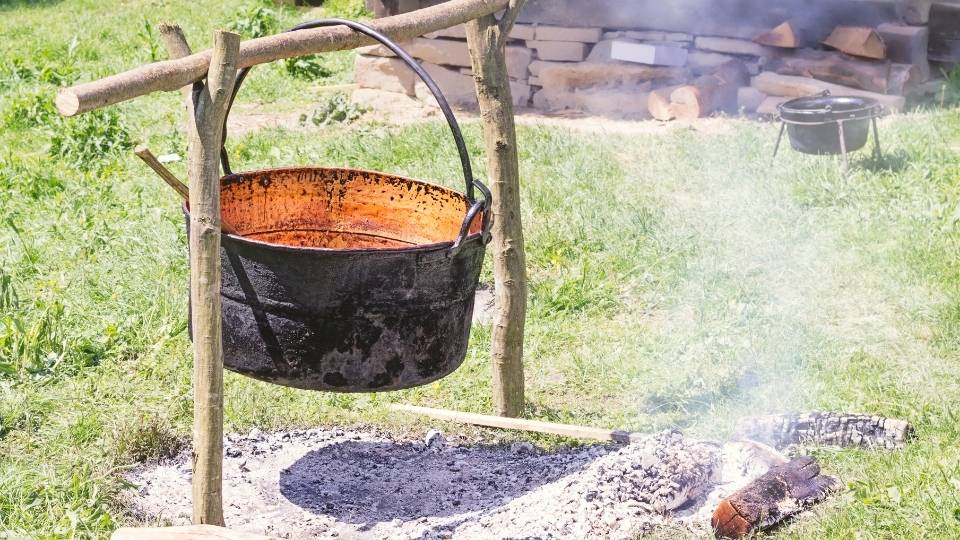
Cast iron cookware was invented in China in the 5th century BC. People used vintage cast iron to make plowshares, weapons, and of course, pots.
Why is Cast Iron Cookware Popular?
Cast iron is a great material for cookware because it's durable, heats evenly, and can go from the stovetop to the oven.
It's also relatively inexpensive, which is why it's so popular among home cooks, even those on a budget.
Plus, if you take care of your cast iron pan, it can last for generations.
If you're looking for an all-purpose pan that can do it all, cast iron is a good option.
You can use it to fry chicken, make a grilled cheese sandwich, bake a cake, or even cook a steak on the grill!
The only downside to cast iron is that it's heavy and can be difficult to lift if you're not used to it. But once you get the hang of it, you'll be a pro in no time.
So, now that we know what cast iron is and why it's so popular, let's talk about the safety of cooking with cast iron pans.
Is Cast Iron Cookware Safe to Use?
The short answer is: yes, cast iron is safe to use for cooking.
The long answer is a little more complicated.
Cast iron is made of iron, which is a naturally occurring element. It's also one of the most abundant elements on earth, making up about five percent of the earth's crust.
So, what does that mean for the safety of cooking with cast iron pots and pans?
Well, when you cook with cast iron pots and pans, some of the iron will leach into your food. Moreso if you cook acidic foods like tomato sauce.
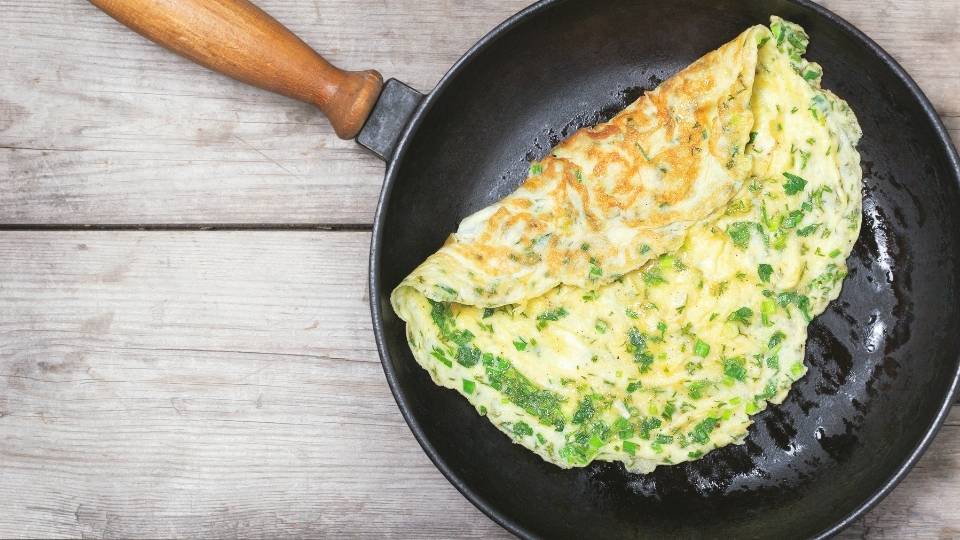
This is called "iron absorption."
Iron is an essential nutrient that our bodies need to function properly. In fact, our bodies need iron to make hemoglobin, which carries oxygen in our blood.
So, when you cook with cast iron and some of the iron leaches into your food, you're actually getting a little boost of this essential nutrient.
Does Cast Iron Really Add Iron to Your Diet?
This is something that's been said for a long time. Some people say it's fact, some people claim it's just an old wive's tail. So, what's the truth
Well, according to a recent review of 11 studies by PLOS One, eating food prepared in a cast-iron pan significantly increased the amount of dietary iron in the blood of a person with Iron Deficiency Anemia in certain cases.
So, there's some evidence that using cast-iron pots and pans could help reduce IDA (iron deficiency anemia), especially among kids and pregnant women. This is also likely to be a cheaper way to get iron into your diet than using supplements.
That being said, there's still more evidence and research needed before we can actually say how much iron is transferred from the cookware to your food (it's probably a few milligrams at most).
So, it's best not to rely on cooking with cast iron pots and pans alone as your main source of dietary iron, even if it can help you get a bit more iron in your diet.
Now, back to the main question...
Are Cast Iron Skillets Safe?
So, cast iron adds more iron to your food. That's proven.
But, of course, too much of anything is never a good thing. It's possible to get too much iron in your diet. This can lead to a complication called iron toxicity.
Consuming excess iron can lead to constipation, diarrhea, vomiting, and stomach pain.
In extreme cases, very high overconsumption of iron can be fatal.
Can Cooking with Cast Iron Give You Too Much Iron?
Probably not.
Cast iron likely releases only a small amount (1-3mg) of dietary iron per meal. If you're cooking something acidic, like tomatoes, it can be higher (around 10mg). Keep in mind these are just estimates, since it's not confirmed how much iron these cast iron pans release.
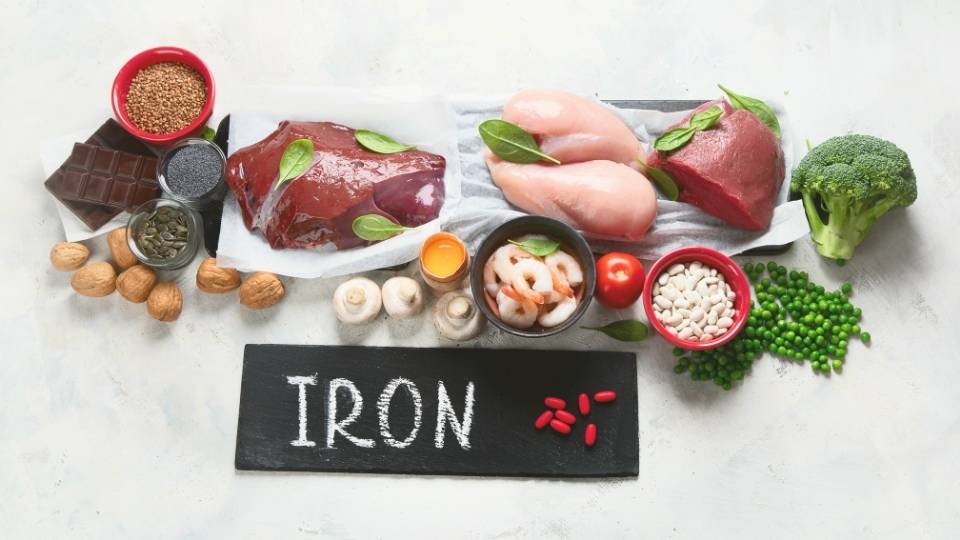
As for how much iron you can consume without negative health effects, the upper limit is about 45mg for adults (40mg for children).
Also, if you season your cast iron pan properly, it will likely release even less iron per meal.
So, unless you have hemochromatosis or another condition that causes high iron levels, you should be fine.
If you're worried about getting too much iron, simply don't cook acidic foods in your cast iron cookware.
Also, make sure you have a high-quality set of cast iron cookware. This will ensure that the iron won't leach as much into your food or be harmful in any way.
Are There Any Cast Iron Cookware Health Concerns?
Yes, there are a few health concerns you should be aware of when using cast iron cookware.
First, if you have a condition that causes high iron levels, you should avoid cooking acidic foods in your cast iron pans, which will release more iron.
As we mentioned before, acidic foods can cause more iron to leach into your food. And, if your blood is already high in iron, this could cause problems.
You could opt to use enameled cast iron cookware instead. This type of cookware has a coating that inhibits the leaching of iron into your food.
Another health concern that's a bit different has to do with the weight of cast iron. Cast iron skillets are known for being quite heavy, usually six to eight pounds.
If you have a cast-iron pan that's particularly heavy, it could be difficult to lift and maneuver.
This could cause problems if you're trying to cook quickly or if you have a weak grip. For people with sensitive wrists or the elderly, this is definitely something to be aware of.
In these cases, it might be best to look for lighter cast iron pans or use another type of cookware altogether.
What Are the Health Benefits of Cast Iron Cookware?
Now that we've gone over some of the potential health concerns of cast iron cookware, let's talk about the benefits.
As we mentioned before, cast iron cookware can increase the amount of iron in your food.
This is especially beneficial for people who have Iron Deficiency Anemia or at risk for developing IDA.
Cast iron is also known for being non-toxic. It doesn't release harmful chemicals into your food the way that some other types of cookware can.
And, unlike aluminum or non-stick cookware coated with PTFE, cast iron doesn't seem to be linked to any negative health effects.
Like we mentioned earlier, it's been used for literally thousands of years! The same can't be said for most other types of cookware.
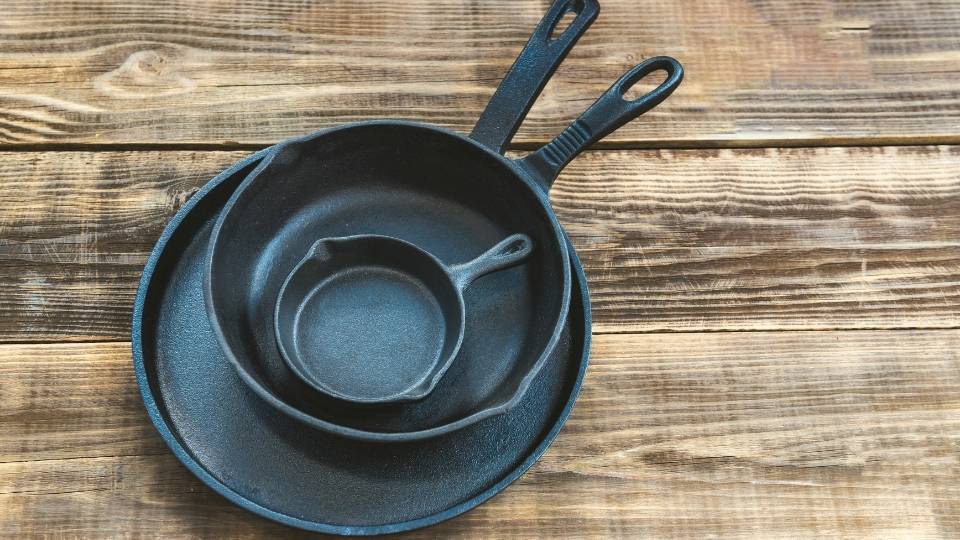
There are also a few other benefits of using a cast iron pan, unrelated to health. For one, it's known for being durable and long-lasting.
If you take care of your cast iron skillet, it could last for decades. And, if it does start to show signs of wear and tear, it's easy to refinish it at home.
Cast iron is also known for being affordable. It's usually less expensive than other types of cookware, like stainless steel.
And, since it lasts so long, you don't have to replace a cast iron pan as often. This makes it a great option for people on a budget.
Finally, cast iron is known for being versatile. You can use it on the stovetop, in the oven, and even over an open fire.
This makes it a great option for people who like to camp or who are looking for an all-in-one type of cookware.
Is Rust on a Cast Iron Skillet Dangerous?
One of the most common questions people have about cast iron is whether or not rust is dangerous.
The short answer is no, rust on cast iron pans is not dangerous. In fact, it's actually quite easy to remove.
If you find rust on your cast iron pans, simply scrub it off with a stiff brush and some soap and water.
Once the rust is gone, rinse the skillet well and dry it completely. Then, apply a thin layer of cooking oil to help prevent future rusting.
Keep in mind that you should only cook with a cast iron pan that's free of any defects, like cracks or chips.
If there are any damaged areas on your skillet, it's best to discard it and buy a new one.
How to Find A Good Set of Cast Iron Pans
Now that we've answered some of the most common questions about cast iron cookware, let's talk about how to find a good set.
There are a few things you'll want to keep in mind when you're shopping for cast iron cookware.
First, make sure to look for a skillet that's made from quality materials. This is especially important if you're planning on using it frequently.
It should also be smooth and evenly coated with a layer of enamel or seasoning. Avoid any skillets that have defects, like cracks or chips.
Second, pay attention to the size and weight of the skillet. If it's too heavy or bulky, it might be difficult to use.
And, if it's too small, you might not be able to cook enough food at one time.
Third, consider the price. Cast iron is usually less expensive than other types of cookware, but there are still a wide range of prices out there.
Don't necessarily go for the cheapest option, but don't overspend either. There's no need to break the bank on a cast iron pan when a cheaper one will do just fine.
Finally, make sure to read the reviews before you buy anything. This is especially important if you're buying cast iron cookware online.
Take some time to read what other people have said about the products you're considering. This can help you narrow down your options and find the best set of cast iron cookware for your needs.
If you're looking for a good, safe set of cast iron cookware, be sure to check out our list of the best cast iron skillets.
We reviewed the most popular options for cast iron cookware, and we think you'll love the set we've chosen as our top pick.
Click here to read our full review of the best cast iron pans.
How to Use Cast Iron Cookware
If you're new to cooking with cast iron, here are a few tips to help you get started.
First, it's important to season your cast iron pan before using it for the first time. Seasoning is what gives cast iron its signature non-stick surface.
It also helps to prevent rusting and makes the skillet more durable. To season your cast iron skillet, simply rub it with a thin layer of cooking oil and bake it in a preheated oven for an hour or so.
Once your skillet is seasoned, it's time to start cooking. Cast iron is known for being a great option for cooking meat, so start with something like steak, chicken, or pork chops.
If you're not sure how to cook a steak well in a pan, check out our article on how to cook the perfect steak on the stove.
You can also use your cast iron pans to make other types of food, like vegetables, pasta dishes, and desserts.
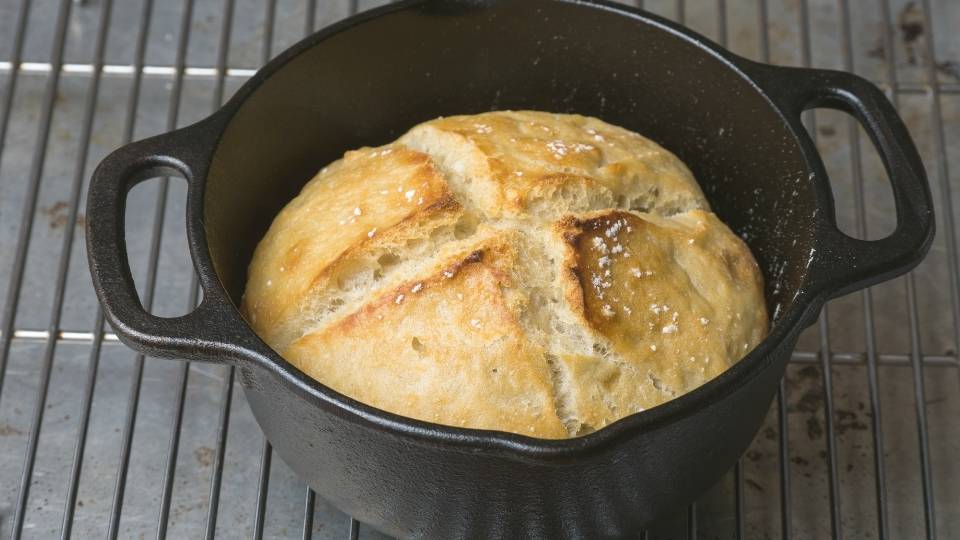
The possibilities are endless. Just be sure to avoid using any abrasive cleaners or scrubbers on your cast iron skillet, as this can damage the seasoning. Cleaning cast iron should only involve hot water and some rags or paper towels.
FAQ: Is Cast Iron Safe?
Is cast iron safe to cook with?
Yes, cast iron is safe to cook with as long as it is not damaged or defective.
You should also season your cast iron skillet before using it for the first time to help prevent rusting and give it a non-stick surface.
Can I use cast iron cookware on a glass stovetop?
Yes, you can. We actually have an article all about the best cast iron skillets for glass top stoves. Check it out!
Can cooking in cast iron make you sick?
No, cooking with cast iron will not make you sick.
The only exception to this would be if you have a condition that causes you to absorb excess iron from food, or if you eat acidic foods cooked in cast iron multiple times per day.
Aside from these unlikely scenarios, cast iron is perfectly safe to cook with.
Do I need to use oil when cooking with cast iron?
It is not necessary to use oil when cooking with cast iron, but it can help to prevent sticking and makes cleanup easier.
If you do use oil, be sure to use a high-smoke point oil like vegetable oil, canola oil, or peanut oil.
What can you not cook in a cast iron skillet?
There is no definitive answer to this question, as it depends on personal preferences and the condition of your cast iron skillet.
Some people avoid cooking acidic foods like tomato sauce in cast iron, as it can cause the skillet to rust. Others avoid cooking delicate foods like fish or eggs, as they can stick to the skillet and be difficult to remove.
Ultimately, it is up to you to decide what you do and do not want to cook in your cast iron skillet.
Conclusion: Is Cast Iron Safe for Cooking?
All in all, cast iron is a safe, healthy option for cookware. It is non-toxic and can actually help increase the iron content in your food.
However, there are a few things to keep in mind when cooking with cast iron.
First, be sure to season your cast iron skillet before using it. This will help prevent rusting and give the skillet a non-stick surface.
Second, avoid using any abrasive cleaners or scrubbers on your cast iron skillet, as this can damage the seasoning.
Third, if you have a condition that causes you to absorb too much iron from food, or if you eat acidic food cooked in cast iron multiple times per day, you may want to avoid cooking with cast iron.
Other than that, cast iron is a great option for healthy cooking. Try it out for yourself and see!